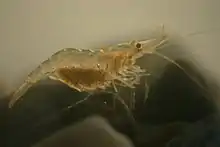Palaemonetes pugio
Palaemonetes pugio (daggerblade grass shrimp) is a small, transparent shrimp with yellow coloring and brownish spots. It can be found in estuarine and tidal marsh habitats throughout the western Atlantic Ocean and Gulf of Mexico. Palaemonetes pugio has a smooth carapace and abdomen, as well as three pairs of legs. The second pair is the strongest, while the third pair lacks chelae (claws). It reaches a length of around 5 cm (2.0 in), and has a life span of around one year. Like most grass shrimp, it is a forager and feeds on a variety of items, including microalgae. They themselves are consumed by killifish and other small foraging fish.[1]
| Palaemonetes pugio | |
|---|---|
 | |
| Scientific classification | |
| Kingdom: | |
| Phylum: | |
| Subphylum: | |
| Class: | |
| Order: | |
| Infraorder: | |
| Family: | |
| Genus: | |
| Species: | P. pugio |
| Binomial name | |
| Palaemonetes pugio Holthuis, 1949 | |
References
- Lipke B. Holthuis (1949). "Note on the species of Palaemonetes (Crustacea Decapoda) found in the United States of America" (PDF). Proceedings van de Koninklijke Nederlandsche Akademie van Wetenschappen. 52: 87–95.
Further reading
- Georgiandra Little (1968). "Induced winter breeding and larval development in the shrimp, Palaemonetes pugio Holthuis (Caridea, Palaemonidae)". Crustaceana. Supplement 2: 19–26. JSTOR 25027384.
- A. C. Broad (1957). "Larval development of Palaemonetes pugio Holthuis". The Biological Bulletin. 112 (2): 144–161. JSTOR 1539193.
- Sue A. Chaplin-Ebanks & Mary C. Curran (2005). "The effect of the parasitic isopod, Probopyrus pandalicola (Packard, 1879), on tidal activity patterns of the grass shrimp, Palaemonetes pugio Holthuis, 1949". Crustaceana. 78 (9): 1053–1061. doi:10.1163/156854005775360990. JSTOR 20107579.
This article is issued from Wikipedia. The text is licensed under Creative Commons - Attribution - Sharealike. Additional terms may apply for the media files.